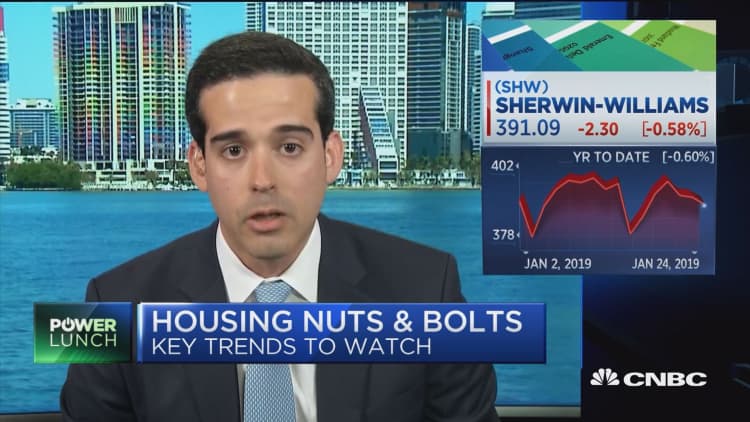After several years of booming business, home remodeling growth is expected to shrink this year.
Demand is slowing because home values aren't gaining as much, mortgage interest rates are rising and fewer homes are selling. Both buying and selling are top drivers of home renovations.
"Remodeling activity tends to go hand in hand with home sales, so when a homeowner is preparing their home for sale they're likely to do some work just getting their home ready for the market," said Abbe Will, associate project director at Harvard's Joint Center for Housing.

"Then really in the first two or three years after purchase," Will added, "that new homeowner typically spends quite a bit more on home improvements, making that home kind of fit their needs, customizing it, maybe doing some work before they even move in."
New owners spend about 30 percent more on fixing up their new purchases than longtime residents.
That's just part of why growth in home renovations is expected to fall to the lowest level in three years, according to a new report from HJCH.
Contractor Justin Sullivan is plenty busy this winter, completely gutting a historic Washington, D.C., home and adding on to it. But he is less sure about how his business will be six months from now.
"Generally architects are six months ahead of us in terms of seeing slowdowns, and we're hearing a little bit that some of the architects, some of the design firms are slowing a little bit, which will probably hit us in six to 12 months."
While the remodeling business is expected to slow, consumer spending on projects is expected to rise slightly because construction costs are still very high, making renovations more expensive.
"We're looking to the folks in our industry to bring their prices down as much as possible. That's a little bit difficult with tariffs being what they are, with the cost of materials being what they are."
The slowdown in overall projects will hit home improvement retailers like Home Depot, Lowes, Masco and Sherwin-Williams. Sherwin-Williams just reported a disappointing fourth quarter, its CEO saying the weakness was "across the board."
A big part of that is weaker consumer sentiment in housing overall, driven by rising mortgage rates, which make a renovation project more costly.
"If they're going to do a cash out refi, or they're looking at a home equity loan or line of credit, I think the sentiment is that homeowners are taking a pause and wondering if that's really the right move right now, and then thinking, we don't have to do this major discretionary project now. We can put that off and see what's happening with the market," said Will.
There is also a growing belief that home prices have peaked.
"I think any time that they see the value of their homes either moderating or dropping they're going to think twice about how much they want to invest in their home," added Sullivan.
The majority of homeowners use home equity, either through a cash-out refinance or a second line of credit, taking money out of their homes to fund what they put into their homes. While home values are softening, they are unlikely to fall dramatically in most parts of the country.
Still, homeowners are very emotional about their nests, given that it is likely their single largest investment. That means anything and everything will weigh on their decisions — stock market volatility, the government shutdown and the growing fear that the economy will weaken.
"I think for now the thought is that this is short-term, but if it continues, if the shutdown continues, if the economy continues downturn, we'll see that more broadly in our industry," said Sullivan.


